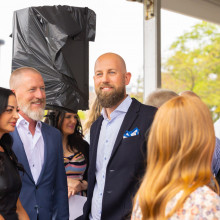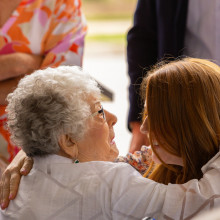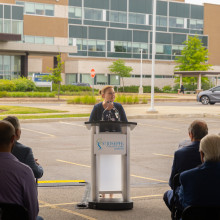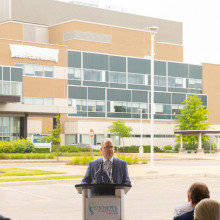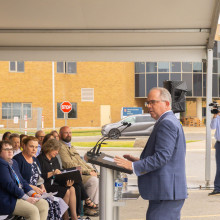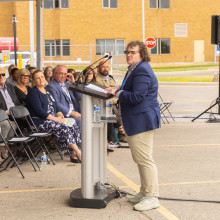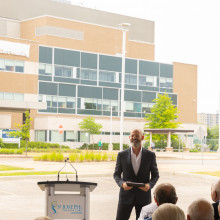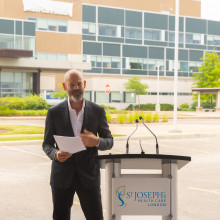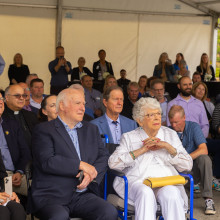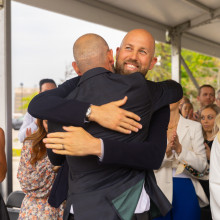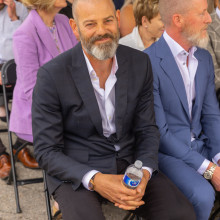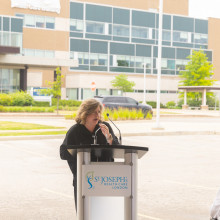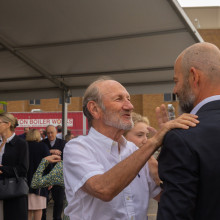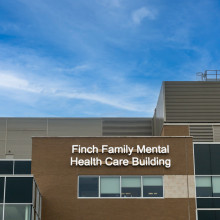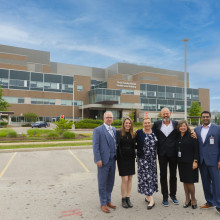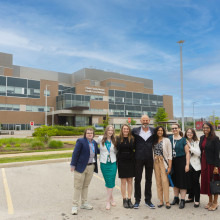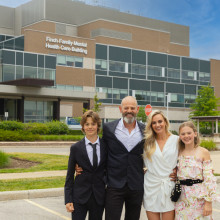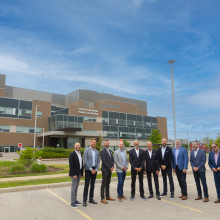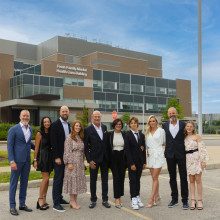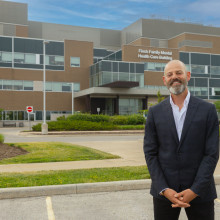$5 million gift to fuel mental health transformation
A generous $5 million personal donation from Ryan Finch will fuel new research with a goal of transforming the mental health care system locally.
The donation will support an innovative new term research Chair in Mental Health System Transformation – that will work to develop collaborative initiatives that further mental health system change in London. The funds will also support expansion of St. Joseph’s Mental Health Incubator for Disruptive Solutions (MINDS) – a youth mental health care project; and support the development of special initiatives that further mental health care system changes in London.
As a business leader and family man, Ryan understands the importance of mental health in all aspects of life. This motivated him to work closely with the senior leaders at St. Joseph’s to understand the full scope of mental health care needs, and what it might take to transform the system.
“Transformation is about fundamentally rebooting the system,” says Jodi Younger, Vice President of Patient Care and Quality at St. Joseph’s. “The current system is fragmented and can be confusing and frustrating.”
Dr. Arlene MacDougall agrees.
Dr. MacDougall is the principal researcher for MINDS, a psychiatrist, and Assistant Professor, and says the current system should be proactive, not reactive because too often, it is only when a mental illness becomes debilitating, that an individual seeks help.
Jodi adds that St. Joseph’s has been working to improve the system and is uniquely positioned to continue leading the change needed in mental health care in the community. She says that St. Joseph’s has the leadership, ability, capacity and most importantly the passion to do this work.
“We’re incredibly grateful to Ryan for this donation and for working with us to be part of the solution,” says Jodi. “He’s had a long-standing interest in supporting mental health improvements and making things better for mental health and addiction services, and now he has stepped up in an extraordinary way.”
Ryan is no stranger to philanthropy. He has been contributing to St. Joseph’s since 1991. His support grew over time with his interest soon focusing largely on mental health. For nearly ten years, Finch Auto Group has been involved with the annual Breakfast of Champions mental health breakfast event – which raises funds for mental health care programs at St. Joseph’s.
The community-minded businessman also launched the Match My Donation fundraiser raising $1.15-million supporting more than 100 charities, including St. Joseph’s Health Care Foundation, which were struggling without in-person fundraisers during the COVID-19 pandemic.
Ryan’s philanthropic efforts aren’t always the headline-making kind. Deeply concerned about the growth in homelessness, Ryan and his son have given food and winter clothing to those people who are living and sleeping rough in the community.
Reflecting on this recent donation, Ryan says that the drive to succeed in business and donate to charitable causes began at an early age.
“My dad imparted on me when I was young to give back to the community you take from,” says Ryan.
As President of Finch Auto Group and Finch Group of Companies and the employer of 500 people across southern and southwestern Ontario, Ryan is no stranger to the mental health struggles people are managing. And he feels a responsibility to do his part to make the world a better place to live.
He’s also a father, with two pre-teen children who are navigating an ever-changing society fraught with mental health challenges.
“I hope this research and the resulting changes to our health care system help people get the assistance they need,” he says. “Every moment when someone is hurting is a moment for you to be supportive.”
This donation marks one of the largest financial contributions to mental health research of its kind in southwestern Ontario. In recognition of this donation from Ryan, St. Joseph’s is pleased to name the Finch Family Mental Health Care Building at Parkwood Institute, as well as the term-funded Chair.
“There is great value and importance in the transformative gift and in putting a prominent name on a mental health building, says Michelle Campbell, Foundation President and CEO. “It will start breaking down community barriers on stigma and open conversations.”
“We feel like the lucky ones being able to do this,” says Ryan. “We want to own it and be loud about it, to hopefully inspire others to consider what they can do.”
St. Joseph’s Health Care London and St. Joseph’s Health Care Foundation extend their sincere appreciation to Ryan Finch for this meaningful donation in support of mental health care research.
Others wishing to also contribute to the work underway for mental health system transformation are invited to support the Mental Health Care Innovation Fund. Please contact Lisa Giroux, Senior Development Officer, St. Joseph's Health Care Foundation or call 519-646-6085.
Read more about two of the areas that will be funded through his donation.
Finch Family Chair in Mental Health System Transformation
A first-in-Canada Chair in Mental Health System Transformation will serve as a leader in developing a new systems approach to mental health care. They will use a highly collaborative, transdisciplinary and cross-sectoral approach, that drives equity, diversity, inclusion and decolonization and uses social innovation coupled with diverse research methods is needed to meet the growing issue of mental illness and addictions.
MINDS 2.0
MINDS is the first social innovation lab in Canada focused on youth, aged 16-25, aimed at addressing complex community mental health system challenges. It engages community members and youth with lived experience, who have a stake in mental health to help redesign the system and find new solutions. MINDS 2.0 builds on the momentum created by MINDS and expands research capacity to include young adults with more severe, complex mental illnesses and addiction, and examines social factors such as poverty, homelessness, and trauma that contribute to mental health illnesses. It will also develop a training program for mental health providers such as clinicians, social service workers, police officers etc. to train them to continue the work in their workplaces to find new solutions.
